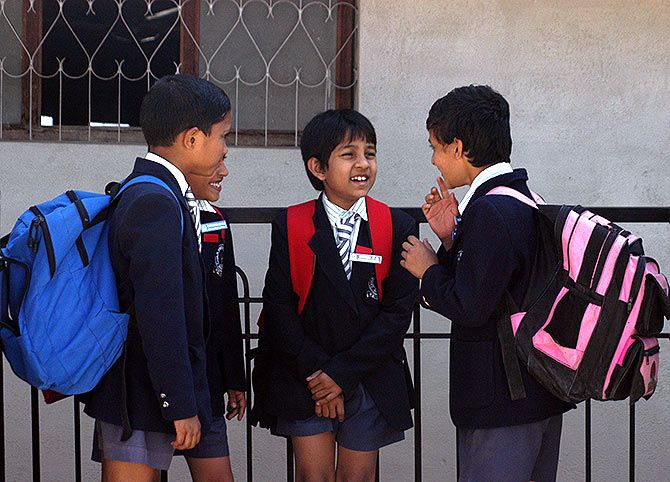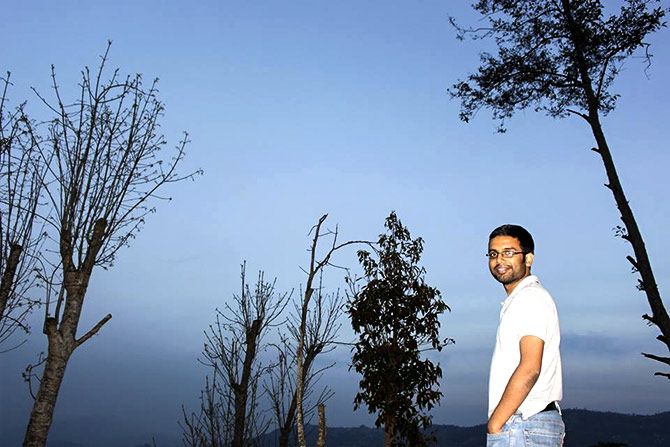'Younger children don't really distinguish based on class, gender, income and so on.'

Can the reservation of seats for economically weaker sections in private unaided schools bridge the gaps we see in our society?
Can it make it more inclusive?
Is there a psychological cost that children from economically weaker sections pay to study at the private options?
Why don't schools manage to fill the reserved seats?
Adopted in 2012, The Right to Education (Section 12 (1)C) requires private unaided schools to reserve 25 per cent of their seats in an entering class.
At a national level, there are around 2.2 million seats available on a yearly basis, of which 1 per cent seats have so far been filled up.
Eleven states are implementing it at different levels so far.
Eighteen states are still in violation of the Supreme Court.
Tarun Cherukuri, a chemical engineer from BITS Pilani and a Fulbright scholar, started Indus Action after he was back from studying at the Kennedy School of government in Cambridge, Massachusetts.
Indus Action helps in getting the information across to families, helps them navigate the state bureaucracy to get the requisite certificates and complete the application process.
Cherukuri spoke to Anjuli Bhargava on the merits of the policy and where it has reached so far.
Although 25 per cent of the seats are reserved for economically weaker sections, not everyone is convinced that it makes sense or that it works.
Over the last several years, there has been a huge shift of students from government schools to private budget schools.
Between 2010 and 2014, it is estimated that 11 million students left government schools and 16 million joined private schools.
This is despite the fact that parents can educate their children for free in government schools.
Also, teachers in government schools earn a lot more than private schools. They have far more job security. Often, they even have better infrastructure.
Yet, budget private schools tend to do slightly better than government schools. Middle and high-income schools of course do better.
Why should it be so if they have better teachers and infrastructure?
Accountability is much higher.
Since parents are spending 10 to 20 per cent of their monthly income to send their child to a budget private school, they demand much more.
Isn't there a high psychological price to be paid by these children? They will not be accepted easily in say the middle and high income school peer set?
There's no denying it won’t be easy for the initial cohorts.
This policy, in a way, tries to mirror all the baggage that we carry inside a classroom.
My take on that is that children in the earlier years (ages 3 to 12) don't have very definite identity consciousness.
So they don't really distinguish based on class, gender, income and so on.
They may notice differences in physical attributes, but evidence shows that there is a window of opportunity when children are almost purely egalitarian.
They don't have biases.
So if one is looking to develop a more inclusive society, this is the best age to do it.
There is an opportunity for children to form friendships across barriers.
It is the best stage to make children more inclusive generationally.
It's much harder to cultivate social inclusion at the higher education level.
Second, it is 25 per cent of the total students every year.
So over a period of 8 to 10 years, the school will actually have a large body of similar socio-cultural backgrounds if the policy is adhered to in all the years.
The acceptance levels will grow each year.
It's like the first set of say Indian or African-American kids going to study in an American or an Ivy league college.
They may have faced the initial resistance or barriers but over a period of time, societal attitudes change.

Would you then agree that reservation at the higher education stage is undesirable or ineffective?
This is another debate.
Affirmative action needs to probably happen at that stage and at the employment stage, given the years of social exclusion.
But I am of the firm belief that the best stage to invest is early.
Many middle and high income schools claim that they don't get enough applications and so cannot admit 25 per cent from economically weaker sections.
Applications are low in some states like Haryana because the implementation of the law is yet to set in seriously.
A second reason is that even after students get admission, parents may back out at the last stage.
It is too intimidating or too much trouble for many.
Sometimes, schools ask for additional fees for something -- like books, uniforms and so on -- which parents cannot or don't want to pay for.
Third, in many schools, there is resistance from the school end.
There is a reimbursement given by government for these seats, but it is in many cases below the per child cost to the school.
In Delhi, for instance, it is Rs 17,000 per child per annum; 50 to 55 per cent of schools charge more than this.
In such cases, many times the schools are not very keen to admit the students.
What about the scams that were happening? Rich kids being admitted on seats reserved for economically weaker sections?
This is no longer possible in Delhi at least.
The whole process is now online.
The seats are allocated through a randomised lottery.
Schools have very little discretion in the new system.
I am sure other states will follow Delhi's example given time.











